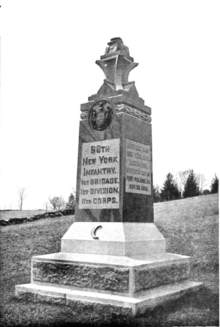68th New York Volunteer Infantry Regiment
| 68th New York Volunteer Infantry Regiment | |
|---|---|

Monument to the 68th New York Infantry, at Gettysburg, Pennsylvania.
|
|
| Active | July 22, 1861 – November 30, 1865 |
| Country |
|
| Allegiance |
|
| Branch |
|
| Type | Infantry |
| Nickname(s) | "Cameron Rifles", "Second German Rifle Regiment" |
The 68th New York Volunteer Infantry Regiment served in the Union Army during the American Civil War. Also known as the Cameron Rifles or the Second German Rifle Regiment, the men were mostly German immigrants. Organized in July 1861, three months after the outbreak of war, the 68th saw service in the Eastern and Western theaters.
As a part of the Army of the Potomac, it was initially assigned to the defenses of Washington, D.C. Later, the 68th was transferred to the Shenandoah Valley and fought at the Battle of Cross Keys. The men of the 68th were then reassigned to central Virginia and found themselves in the thick of the fighting at Second Bull Run. After returning to the nation's capital, the regiment fought in Chancellorsville and was routed by Confederate forces. At Gettysburg, they saw battle on two of the three days and took heavy losses.
The regiment was then transferred to the west and participated in the Chattanooga Campaign. The 68th fought in the battles of Wauhatchie and Missionary Ridge, assisting in the Union victories there. The regiment marched to relieve the siege of Knoxville, and then spent the last year of the war on occupation duty in Tennessee and Georgia, before being disbanded in November 1865.
On July 22, 1861, the United States War Department authorized Robert J. Betge to raise a volunteer infantry regiment in New York. Recruited to serve for three years, the men came mostly from Manhattan (New York City), and also from New Jersey, Maryland, and Pennsylvania. The mostly German immigrants were also called the "Second German Rifles" (the First German Rifles, raised several months earlier, were the 8th New York Volunteer Infantry Regiment), but Betge called the regiment the "Cameron Rifles", after Secretary of War Simon Cameron. The officers were also German, and many had served in the armies of Austria, Prussia, and other German states. In all, 1,020 men filled the ranks when the regiment had finished recruiting.
...
Wikipedia
